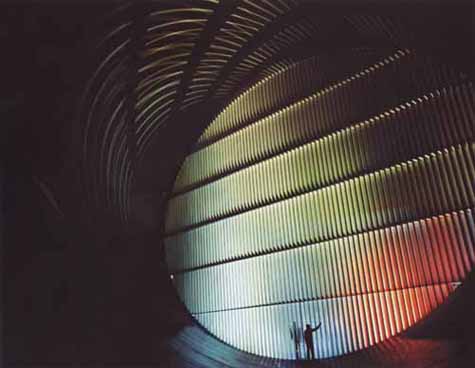Writer Pelin Tan gives a lecture on the work of Emre Hüner on the occasion of his solo show at Extra City's Project Room. The lecture is on Wednesday 8 December at 19:00.
In collaboration with 0090 festival.
'Beyond Biopolitics': on Emre Hüner’s Works
“There is, however, something else, something terrible, which floats in space, and seems to want to approach me. Before any sadness, any sorrow or any clearly definable loss, there is something else, which might be called the pure terror of space. Was this the last stage? What had I done to deserve such a fate? And what had men, in general, done?”[i]
In Michel Houellebecq's novel 'The Possibility of an Island', Daniel 25, the 25th clone of Daniel 1, decides to leave his native environment (totally clean, clinical, controlled and hyper-technological) to discover the world outside (destroyed cities, wild nature, tribal communities and ruined urban spaces) after reading the diary of Daniel 1. The world he finds is ruined, and as Daniel 25 possesses no human feelings, he attempts to come to terms with his new environment by positioning himself according to his lack of feelings, and not against them. In the end, however, he discovers completely new feelings that don't correspond fully to those of a normal human being, and in effect discovers a space somewhere in between a particular spatial condition and his own subjectivity. The conflict of the feelings between cloned Daniel and wild, ruined nature forces him to invent a new relation to space. Houellebecq's Daniel 25, in spite of being unable to place himself firmly in a "space," nonetheless discovers forms for his own "un-relation" to it. The notion of spatial empathy between nature and human has been re-organized under modernity since the last century. Our relation to destruction, vertical cities and urban warfare as citizens, has been transformed in this century, influencing our understanding of the relationship between nature and the human. Urban warfare is based on forms of destruction and accordingly surveillance structures in urban centers have arisen, as we have especially witnessed after 9/11. In this lecture, I would like to elaborate the unconditioned subjectivity in hyper-scientific space (a condition of a failed subjectivity of hyper-modernity) by referring to the character of Houellebecq’s novel who, is in a conflict of feeling in positioning himself ethically. Also, I will focus on the shift of urban warfare from aerial war from the 20th century[ii] to post 9/11 conditions of biopolitics. In “Juggernaut”, the relation between object and subject; gestures of scientists and their analysis; the distinction between “still nature” and urban warfare are mounted in a imaginative structure. This structure presents not only historical facts and the failure of subjectivity but also shows spatial re-organization and destruction of our current time, which goes to search for meanings beyond biopolitics.
[i] p.373, Michel Houellebecq, The Possibility of an Island, Phoenix, London, 2006.
[ii]p.38, Stephen Graham, Cities as Strategic Sites: Place Annihilation and Urban Geopolitics, Cities, War And Terrorism: Towards and Urban Geopolitics, edited by Stephen Graham, Blackwell Publishing, UK, 2004.
Language English
Location Extra City - Antwerpen-Noord, Tulpstraat 79, 2060 Antwerpen


